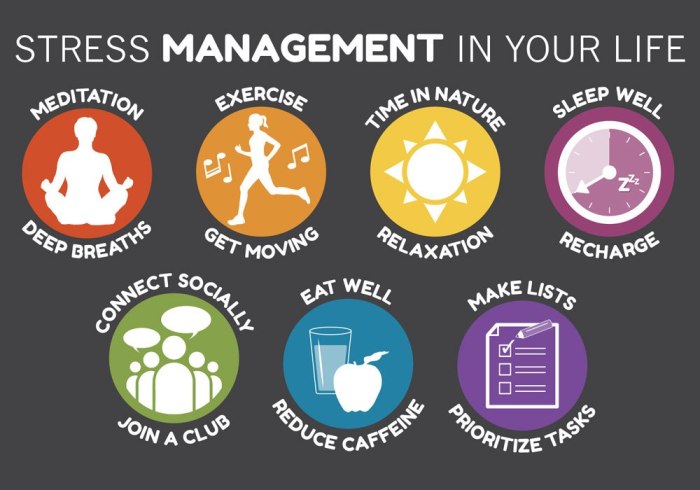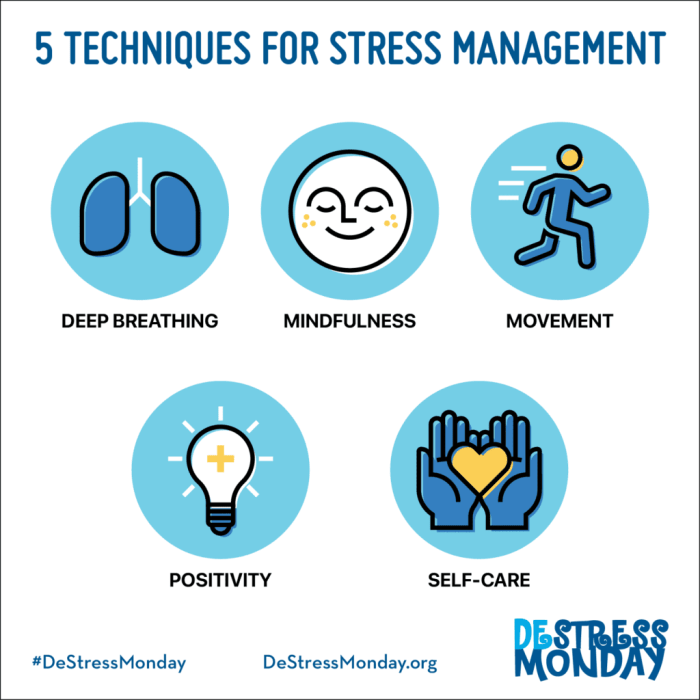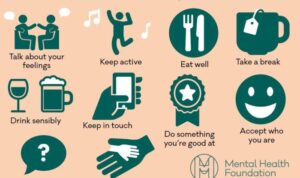Stress Management Tips takes center stage, offering a cool mix of strategies to conquer stress and live your best life. From physical techniques to mental strategies, this guide has got you covered for a chill and balanced lifestyle.
Get ready to dive into a world where stress doesn’t stand a chance, and you can navigate life like a boss.
Introduction to Stress Management Tips
Stress management is the process of using techniques and strategies to cope with everyday stressors and prevent them from becoming overwhelming. It involves recognizing stress triggers, developing healthy coping mechanisms, and taking steps to minimize the negative effects of stress on your mental and physical health.
Managing stress is crucial in daily life because prolonged exposure to high levels of stress can have detrimental effects on your overall well-being. Chronic stress has been linked to a variety of health issues, including high blood pressure, heart disease, obesity, and depression. By learning how to manage stress effectively, you can reduce your risk of developing these conditions and improve your quality of life.
Stress management tips are essential for overall well-being because they provide practical strategies for dealing with stress in a healthy and productive way. These tips can help you build resilience, improve your mental clarity, boost your mood, and enhance your ability to handle challenging situations. By incorporating stress management techniques into your daily routine, you can better protect your mental and physical health and lead a more balanced and fulfilling life.
Physical Stress Management Techniques
Exercise is a key component of stress management, as physical activity helps reduce stress levels by releasing endorphins, the body’s natural mood elevators. Incorporating regular exercise into your routine can have numerous benefits for your mental and physical well-being.
Benefits of Exercise in Stress Reduction
- Increased endorphin production: Physical activity triggers the release of endorphins, which are neurotransmitters that act as natural painkillers and mood elevators, helping to reduce stress and improve overall mood.
- Improved sleep quality: Regular exercise can help regulate sleep patterns, leading to better quality sleep. Adequate rest is crucial for managing stress effectively.
- Enhanced focus and concentration: Exercise can help clear your mind and improve focus, making it easier to tackle daily tasks and responsibilities without feeling overwhelmed.
Yoga and Tai Chi for Stress Management
- Yoga: This ancient practice combines physical postures, breathing exercises, and meditation to promote relaxation and reduce stress. The emphasis on mindfulness in yoga can help you stay present and calm in the face of stressors.
- Tai Chi: Tai Chi is a gentle form of martial arts that focuses on slow, flowing movements and deep breathing. Practicing Tai Chi can help improve balance, flexibility, and mental clarity, all of which contribute to stress reduction.
Mental Stress Management Strategies
When it comes to managing mental stress, there are several effective strategies that can help individuals cope with the challenges they face on a daily basis. These strategies focus on enhancing mental well-being and reducing the negative impact of stress on overall health.
Mindfulness and Meditation
- Practicing mindfulness involves being fully present in the moment and paying attention to thoughts, feelings, and sensations without judgment. This can help individuals become more aware of their stress triggers and respond to them in a healthier way.
- Meditation techniques, such as deep breathing exercises and guided visualization, can help calm the mind and promote relaxation. Regular meditation practice has been shown to reduce symptoms of anxiety and depression, making it a valuable tool in managing mental stress.
Cognitive-Behavioral Techniques
- Cognitive-behavioral therapy (CBT) is a type of psychotherapy that focuses on changing negative thought patterns and behaviors that contribute to stress. By challenging and replacing unhelpful beliefs, individuals can learn to approach stressful situations more positively and effectively.
- CBT techniques, such as cognitive restructuring and behavior modification, can help individuals develop coping strategies and problem-solving skills to better manage stress and improve mental well-being.
Positive Affirmations
- Positive affirmations are statements that individuals repeat to themselves to promote self-belief and positivity. By focusing on affirmations such as “I am capable” or “I can handle this,” individuals can counter negative self-talk and boost their confidence in dealing with stress.
- Regularly practicing positive affirmations can help reframe negative thought patterns and cultivate a more optimistic mindset, leading to reduced stress levels and improved mental resilience.
Lifestyle Changes for Stress Management

In order to effectively manage stress, it is important to make certain lifestyle changes that can have a positive impact on your overall well-being. By focusing on areas such as improving sleep quality, maintaining a healthy diet, and practicing good time management, you can significantly reduce stress levels in your life.
Improving Sleep Quality
One of the most crucial aspects of managing stress is ensuring you get an adequate amount of quality sleep each night. Lack of sleep can lead to increased stress levels, irritability, and difficulty concentrating. To improve your sleep quality, consider establishing a bedtime routine, creating a relaxing sleep environment, and avoiding screens before bed.
Importance of a Healthy Diet
Maintaining a healthy diet plays a key role in managing stress levels. Consuming a balanced diet rich in fruits, vegetables, whole grains, and lean proteins can provide your body with the necessary nutrients to combat stress. Additionally, avoiding excessive caffeine, sugar, and processed foods can help stabilize your mood and energy levels.
Time Management and Prioritization, Stress Management Tips
Effective time management and prioritization are essential for reducing stress in your daily life. By creating a schedule, setting realistic goals, and prioritizing tasks based on importance, you can better manage your time and avoid feeling overwhelmed. Remember to delegate tasks when necessary and take breaks to avoid burnout.
Social and Emotional Support for Stress: Stress Management Tips
When it comes to managing stress, having a strong social support system is key. Your friends, family, and other loved ones can provide the emotional support you need during tough times.
The Significance of Social Connections
- Having a network of supportive relationships can help reduce feelings of isolation and loneliness.
- Sharing your thoughts and emotions with others can help you feel understood and validated.
- Engaging in social activities can distract you from stressors and boost your mood.
Role of Therapy or Counseling
- Therapy or counseling can provide you with professional guidance and coping strategies to manage stress effectively.
- Therapists can help you explore the root causes of your stress and develop healthy ways to deal with it.
- Seeking therapy is a proactive step towards improving your mental well-being and overall quality of life.
Seeking Emotional Support from Friends and Family
- Reach out to your loved ones and express your feelings openly and honestly.
- Ask for help when you need it and accept support without feeling guilty.
- Engage in activities with friends and family that bring you joy and relaxation.
Workplace Stress Management

Managing stress in a work environment is crucial for maintaining overall well-being. Here are some tips to help you navigate workplace stress effectively:
Setting Boundaries at Work
- Avoid taking work home with you to create a clear distinction between work and personal time.
- Learn to say no when you feel overwhelmed with tasks to prevent burnout.
- Communicate your limits and expectations to colleagues and supervisors to establish healthy boundaries.
Maintaining a Healthy Work-Life Balance
- Set specific work hours and stick to them to prevent overworking.
- Make time for activities outside of work that bring you joy and relaxation.
- Prioritize self-care by getting enough sleep, eating well, and exercising regularly.












